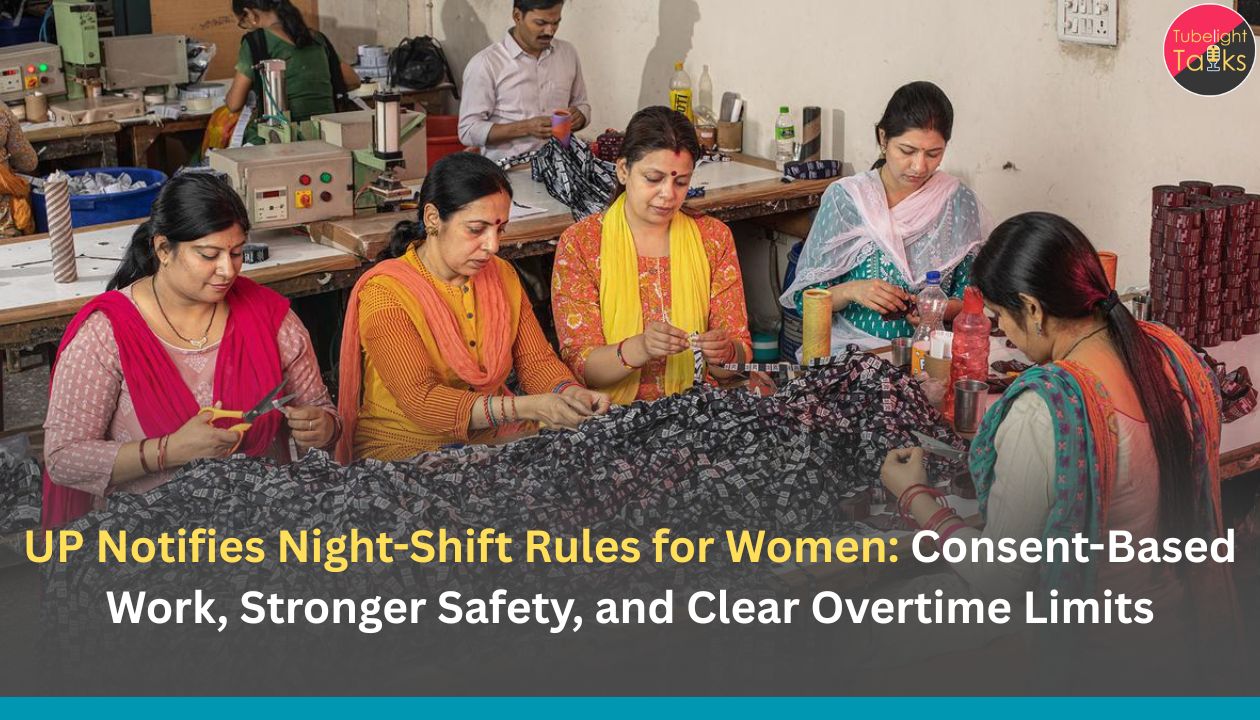Night-Shift Rules for Women: Uttar Pradesh has approved night-shift work for women—from 7 pm to 6 am—on a written-consent basis backed by mandatory safeguards for safety and dignity at work. Employers must provide secure transport, CCTV coverage, adequate lighting, health facilities and PoSH compliance, among other conditions. Separately, overtime parameters have been eased with higher caps and double wages for overtime, aligning with the state’s recent enforcement of the UP Factories (Amendment) Act.
What was announced (and where)
PTI’s update summarizes the policy pivot: UP now allows women to work night shifts with safeguards. See the social post here for context:
Mainstream reports add specifics on timings (7 pm–6 am), written consent, and employer obligations on security, transport and facilities.
Key provisions at a glance
- Consent first: Women can opt in for night duty only with written consent (to be recorded/registered with the labour department as specified).
- Timings: 7 pm–6 am night shift window.
- Safety & infrastructure: Employers must ensure CCTV, secure transport, adequate lighting, female supervisors/guards as prescribed, and functional sanitation/health facilities.
- PoSH compliance: Internal Committee as per Sexual Harassment of Women at Workplace (Prevention, Prohibition and Redressal) Act remains mandatory. (Media summaries reference standard PoSH compliance alongside the order.)
- Overtime & wages: Quarterly overtime cap raised to 144 hours, payable at double wage rates (this is overtime pay, not a blanket “double pay” for all night hours).
- Working hours discipline: Daily/weekly limits must still respect 48 hours/week norms; reforms enable up to 12 hours/day in exceptional cases while staying within weekly caps.
The legal basis: recent state-level changes
UP has enforced amendments to its Factories law after receiving President’s assent, enabling flexibility in shifts and explicit consent-based night work for women. The same framework raises the overtime ceiling and permits up to six hours of continuous work in defined circumstances, subject to consent and safeguards—forming the statutory base for today’s operational order.
What employers must do before scheduling night shifts
1) Obtain and record written consent. Keep a clear paper/digital trail of opt-in consent for each woman employee rostered at night.
2) Transport & route security. Provide point-to-point secure transport, vetted drivers and escort protocols where required. Log trips.
3) CCTV & lighting. Ensure CCTV in approach areas and designated work zones; maintain footage for the prescribed period. Maintain well-lit entry/exit, parking and waiting areas.
4) PoSH & grievance redressal. Keep your Internal Committee active, trained and accessible; communicate 24×7 escalation contacts for night rosters.
5) Health & sanitation. Provide first-aid, rest areas, drinking water and toilets proximate to work floors, with periodic checks recorded.
6) Overtime bookkeeping. If overtime is used, respect the 144-hour/quarter cap and pay 2× wages for the overtime component; clearly reflect this on payslips.
What changes for workers and sectors
- Choice with guardrails: The reform expands choice for women to take roles that require night operations (manufacturing, IT/ITeS, logistics, healthcare, hospitality), but only on consent, with codified safeguards.
- Operational flexibility for industry: Facilities with 24×7 lines (process industries, e-commerce logistics, hospitals) can staff more gender-balanced shifts—if they meet the safety checklist.
- Not a carte blanche: The order does not relax PoSH or occupational-safety laws; high-risk processes continue to have exemptions/limitations (e.g., for pregnant or nursing women under safety norms referenced in reportage).
How this compares nationally
Delhi recently permitted women to work night shifts in shops and commercial establishments, with mandated safeguards—a direction other large urban economies are also taking. UP’s framework now brings factories firmly into this consent-and-safety model.
Why the reform matters (economy & participation)
UP’s female labour participation has been climbing on multiple program levers; the night-shift reform could add formal-sector opportunities in growth hubs if employers execute safeguards well. Context: reportage this year highlighted a rise in UP women’s LFPR alongside Mission Shakti and compliance pushes.
Also Read: Women in Agriculture: The Rise of Rural Agri-Entrepreneurs
FAQs on Night-Shift Rules for Women
1) Is night work compulsory for women?
No. It’s opt-in only—written consent is required before rostering any woman on a night shift.
2) Does everyone on a night shift get “double salary”?
No. Media clarifications note double wages apply to overtime, not to ordinary night hours. The overtime cap has been raised to 144 hours per quarter.
3) What must employers provide for safety?
CCTV, secure transport, lighting, sanitation/health facilities, and full PoSH compliance—including an accessible Internal Committee and grievance channels.
4) Is this only for IT/ITeS, or also factories?
UP’s recent Factories law enforcement underpins these changes for factories; reportage also references broader establishments in practice—always check your unit’s licence/category and the exact wording of the order.
5) What if an employee withdraws consent later?
Employers should honour a withdrawal protocol—move the employee off the night roster without prejudice, and document the change (HR policy best practice).
6) Are there special rules for pregnant or nursing women?
Safety-first exemptions/limitations continue to apply in high-risk processes as per labour and safety norms referenced in coverage.
Work with Dignity: A Values Lens
Good policy writes the rules; good culture makes them real. Sant Rampal Ji Maharaj’s spiritual discourses emphasise truthfulness, non-harm, and service—principles that, at work, translate into honest rostering, safety that goes beyond paper compliance, and genuine respect for consent. When night shifts are truly voluntary, well-protected, and dignified, a workplace turns those values into practice.










